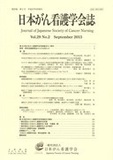Japanese
English
- 販売していません
- Abstract 文献概要
- 参考文献 Reference
- サイト内被引用 Cited by
要旨
本研究の目的は,手術適応外のために定位放射線療法を受ける高齢肺がん患者の体験を明らかにし,必要な看護実践について検討することである.
手術適応外のために定位放射線療法を受ける高齢肺がん患者9名に,半構造化面接を実施し,Krippendorffの内容分析の手法を用いて分析した結果,手術適応外のために定位放射線療法を受ける高齢肺がん患者の体験は,【手術への未練を断ち切れない】【高齢であっても手術に代わる治療法があることに感謝する】【治癒を信じ手術に代わる定位放射線療法に賭ける】【定位放射線療法以外に治療法選択の余地がないなら,治療後の望ましくない結果も合併症発症も治療中の不快感も引き受ける】【良い細胞まで放射線でやられてしまうと恐れる】【定位放射線療法の効果を信じきれない】の6大表題に類型化された.
手術適応外のために定位放射線療法を受ける高齢肺がん患者への看護実践として,まずは,手術への未練を断ち切れず引きずったままながらも定位放射線療法に賭けている患者の治療完遂を支援することである.しかし,治療効果が得られなかった時や治療後の肺臓炎発症時には,断ち切れず潜在し続けている手術への未練が引き金となり,手術適応外と判断されたことへの恨めしさが顕在する可能がある.その時には,これまで幾多の困難を乗り越えてきた自身の人生を振り返ってもらうことで自分のもてる力の再確認を促し,この事態を乗り越えることにつなげるような支援が必要である.また,放射線への恐怖感払拭のための支援,外来受診時や電話訪問による継続看護などの必要性が示唆された.
The purpose of this study was to clarify the experiences of elderly patients receiving stereotactic radiotherapy for lung cancer without operative indication and review the necessary nursing practices.
Semi-structured interviews of 9 elderly patients receiving stereotactic radiotherapy for lung cancer without operative indication and an analysis using Krippendorff's method for content analysis revealed that the experiences of elderly patients receiving stereotactic radiotherapy for lung cancer without operative indication could be classified under 6 main headings: “cannot entirely give up the hope to have surgery,” “appreciating the availability of a therapy that replaces surgery despite old age,” “counting on stereotactic radiotherapy, which replaces surgery, believing in a cure,” “prepared to gratefully accept undesired effects, posttreatment complications and discomfort during treatment if there is no other treatment option but stereotactic radiotherapy,” “afraid that even healthy cells might be destroyed by radiation,” and “cannot fully trust the effects of stereotactic radiotherapy.”
The first step as a nursing practice for the elderly patients receiving stereotactic radiotherapy for lung cancer without operative indication is to support the completion of treatment for the patients who are counting on stereotactic radiotherapy although they are unable to give up their desire and hope for surgery. However, when a patient is unable to achieve the desired therapeutic effect or pneumonitis develops after treatment, the latent, lingering desire and hope for surgery may trigger their resentment for being judged to have no operative indication to manifest. Then support would be needed in order to encourage reassure of their abilities by having them review their own lives in which they have overcome many hardships, allowing them to overcome this situation. In addition, the necessity of support for dispelling the fear of radiation, and of continuing nursing care during office visits and by telephone was suggested.
Copyright © 2015, Japanese Society of Cancer Nursing All rights reserved.


